5 Vital Wilderness Survival Skills For Teens
Wilderness survival skills are essential for anyone who wants to be able to handle themselves in a difficult situation. For preppers, it’s essential to make sure that your teens know these essential skills. As they branch out and spread their wings, often teens and their friends try camping out and hiking on their own.
Being in the wild can prove to be a fun adventure, but also presents some new risks and challenges they need to learn about. This guide will teach you 5 of the most vital wilderness survival skills for teenagers. With practice, your teen can become more confident and capable in the great outdoors!
5 Vital Wilderness Survival Skills For Teens
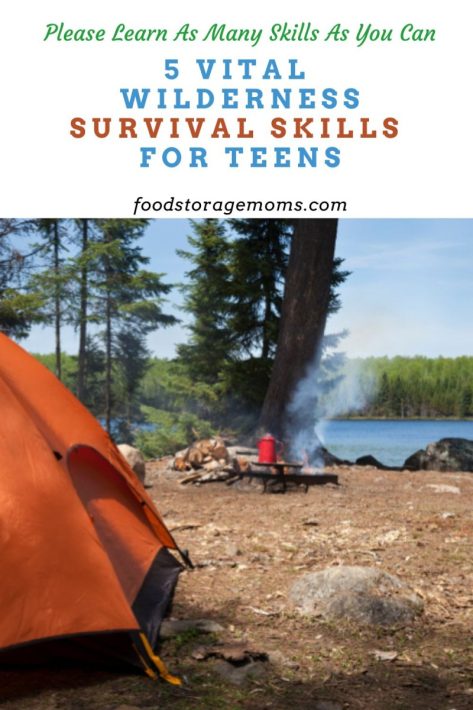
What are Wilderness Survival Skills?
When we think of wilderness survival skills, we often picture scenarios like being lost in the woods or stranded on a deserted island. But these are just two examples of situations where survival skills might come in handy. In reality, wilderness survival skills can be useful in any number of situations, both in the wild and in our everyday lives.
Some basic wilderness survival skills include knowing how to build a shelter to stay dry and warm, find and purify water, and make a fire. These skills are essential for staying alive in an emergency situation, but they can also be fun to learn and practice even if you never find yourself in a truly life-threatening situation. Learning how to build a shelter from scratch or purify water using only natural resources can give you a greater appreciation for the wilderness and help you to better enjoy your time spent outdoors.
Of course, not all wilderness survival skills are purely practical. Some, like learning how to navigate using only the sun or stars, can also be empowering and give you a sense of accomplishment. Others, like learning how to identify edible plants or track animals, can help you to better appreciate the natural world around you. while learning how to find and gather food needed to stay alive.
Why Should Teens Learn Survival Skills?
In today’s world, it’s more important than ever for teens to learn survival skills. With natural disasters becoming more common and the possibility of an emergency situation arising at any time, it’s crucial that teens know how to take care of themselves in a crisis.
Survival skills can help teens stay calm and collected in an emergency situation, and they can also help them feel more confident and empowered. In a world that can be unpredictable and scary, learning survival skills can give teens a sense of control and mastery.
There are many different survival skills that teens can learn, from basic first aid to more advanced wilderness survival skills. No matter what skills they learn, they’ll be better prepared to handle a variety of situations that come their way.
5 Vital Wilderness Survival Skills For Teens
No one knows what the future holds, but preparing for possible emergencies is always a good idea. For teenagers, it’s especially important to have basic wilderness survival skills in case they find themselves in a difficult situation without access to help. Here are 5 vital wilderness survival skills for teens:
1. How to Find Water and Make it Suitable for Use
One of the most important survival skills is knowing how to find water. In a wilderness emergency situation, you may not have access to clean drinking water, so it’s important to know how to find and purify water from natural sources so that you can drink clean water.
There are a few different ways to find water in the wild. One of the easiest ways is to look for sources of running water, like rivers and streams. These are usually the best sources of water, as they’re less likely to be contaminated than still water sources like ponds. If you can’t find any running water, you can look for signs of life, like plants and animals, which can lead you to water sources since they all need water to stay alive.
Since the laws of physics show us that water runs downhill, if they are in a hilly or mountainous area, teens should look for land features that have formed due to years of running water from rain and melting snow runoff. That would most likely be in ravens, gullies, and other prominent topical features where the water has created a groove in the land mass that’s repeated over and over as seasons change and water presents itself.
Once you’ve found a water source, it’s important to purify the water before drinking it. There are a few different ways to do this, but one of the most effective is to boil the water. The CDC recommends bringing water to a rolling boil for one (1) minute. Boiling water will help to eliminate any bacteria or parasites that may be in the water, which could cause you to become very sick.
If the teen knows they’ll be in remote locations where water could be contaminated, they should plan to take along some halazone tablets. These handy tablets have been used for decades as a go-to treatment for questionable water.
The Berkey company makes a number of water treatment products that can really come in handy when you’re out in the wild, and some are pretty small and can be carried easily. They don’t generate large volumes of purified water but should provide enough clean water to easily stay alive. Check out their offerings at www.myberkey.com.
2. How to Build a Shelter
If you find yourself in a wilderness emergency situation, one of the first things you’ll need to do is build a survival shelter. This will help you stay protected from the elements and can also make it easier to signal for help. There are a few different types of shelters you can build, depending on what materials you have available and the environment you’re in.
One of the most basic types of shelters is a debris hut, which can be built using sticks, leaves, and other natural materials. If you have a tarp or other piece of waterproof fabric, you can also use it to build a shelter. In a cold environment, you may need to build an igloo or snow cave for additional protection from the elements.
Building a shelter is one of the most important survival skills you can have, so it’s important to practice before you find yourself in an emergency situation. Familiarize yourself with the different types of shelters and how to build them, and make sure you’re familiar with the materials that make the best components of a sturdy shelter.
Being in a wooded area makes for the best environment for shelter building due to the availability of tree branches, leaves, and small logs. If you have a small axe, it will really make a difference as you gather what’s needed. Having some rope or heavy twine also makes sense if you or your teen plan to spend much time outdoors. Being able to strap things together is the key.
I’ve also written posts about duct tape and how it can be used in a pinch to hold all sorts of things together, including tree branches.
3. How to Build a Fire
Another important survival skill is knowing how to build a fire. A fire can keep you warm, dry your clothes, and cook food. In an emergency situation, it can also signal for help.
There are a few different ways to build a fire. One is to use a lighter or matches if you have them. If you don’t have any tools for starting a fire, you can try using a friction method like the bow drill method. This involves rubbing a stick against another piece of wood to create heat and spark a fire.
Building a fire is an essential survival skill, so it’s important to practice it before you find yourself in an emergency situation. Familiarize yourself with the different methods for building a fire, and make sure you have all the materials you’ll need on hand. Small fire starters are a must if you plan to leave home for the wild. They are small, safe, and efficient.
It would be a great idea for you to take your teen out in the wild for a weekend and have them learn the basics of fire building. This includes gathering small kindling that can catch fire easily, and building a small teepee-style structure above the kindling so the fire can increase in size as the fire gets bigger and stronger. The addition of small branches and logs then adds to the momentum until the fire achieves the size you want.
It’s also important for teens to learn fire safety. They should clear an area away from low-hanging tree branches and bushes. They can then dig a hole and form a tight circle with rocks to help contain the size of the fire. They should never leave a fire burning unattended, and unless it is truly for survival, they shouldn’t be lighting fires in any restricted areas that have been posted.
4. How to Find Food
In a wilderness emergency situation, you may not have access to food. That’s why it’s important to know how to find food in the wild.
There are a few different ways to find food in the wild. One is to look for edible wild plants. This can be tricky, as not all plants are safe to eat. If you’re not sure if a plant is safe to eat, it’s best to err on the side of caution and avoid it. Another way to find food is to set a snare trap or hunt small game animals. This requires more knowledge and skill, but it can be a good way to get food in an emergency situation.
Finding food in the wild is an important survival skill, so it’s important to familiarize yourself with the different options before you find yourself in an emergency situation. Make sure you know which plants are common to your area that are safe to eat, and practice trapping and hunting if you plan to use these methods for finding food.
The next time you take your family out for a camping trip, spend some quality time looking for food sources. Many mountain ranges are home to wild berry plants and flowering plants that can be safely eaten. Your state extension service should be able to provide some information.
Also, you and your family members should become familiar with how to fish. This can be a fun family activity, but also prove to be a lifesaver in tough times. This week I wrote a post about how beginners can learn to fish, check it out in my archives.
5. How to Signal for Help
If you find yourself in a wilderness emergency situation, it’s important to signal for help. There are a few different ways to do this, depending on the resources you have available.
One way to signal for help is to build a fire. The flames and smoke will help to alert others. This can be done in a number of ways as outlined in section #3 above. Another way to signal for help is to use a mirror or other reflective surface to reflect sunlight. This can be used to send signals to rescuers who are looking for you.
Signaling for help is an important survival skill, so it’s important to practice before you find yourself in a survival situation. Familiarize yourself with the different methods for signaling for help, and make sure you have all the materials you’ll need on hand.
More About Survival Skills
- 9 Necessary Survival Skills For Kids
- 7 Basic Survival Skills You Need to know
- Survival Skills to Teach Young Children
- Critical Survival Skills You Should Practice At Home
Why are these 5 essential survival skills so important for teens and others?
The challenge with emergencies and the related skills needed to survive them is that you never know when they may hit and what would be necessary to see you through. On the news today is the situation in Jackson, Mississippi where people are being told not to use any of the culinary water. With the all recent rains, the city water system has become overwhelmed. The infrastructure we all rely on is old and has needed repairs and upgrades for decades. Now the city is having to deal with an issue they should have planned for.
We are all affected from time to time by situations we have no control over. In the Jackson case, the whole populace is being told the water would be unfit for consumption INDEFINITELY! We can have a similar challenge with an unexpected snowstorm where we lose power, a wildfire where we have to evacuate, or a hurricane where we need to bug-in are all circumstances we can’t control but can prepare for.
What gear is important to have in a survival pack?
If you’re putting together a survival pack there are some critical items you should consider a compass, pocket knife, water filter, first-aid kit, tent or tarp for shelter, a satellite GPS, poncho, emergency blanket, axe, and self-defense gear.
- Compass
- Pocket Knife
- Water Filter
- First Aid-Kit
- Tent or Tarp
- Satellite GPS
- Poncho
- Emergency Blanket
- Axe
- Self-Defense Gear
What knots are important to know for survival?
I’d suggest you research and learn to tie some of these knots: bowline, lark’s head, cow hitch, sheepshank, taut-line hitch, and square.
Final Word
Practice these essential wilderness survival skills so you’ll be prepared if you ever find yourself in an emergency situation. And remember, the best way to survive in the wilderness is to avoid getting lost in the first place. So always be sure to follow safe hiking and camping practices, and never go into the wilderness alone or without telling your friends or family where you’re going. May God Bless this world, Linda
Copyright Images: Wilderness Campfire AdobeStock_330786099 by Daniel Thornberg

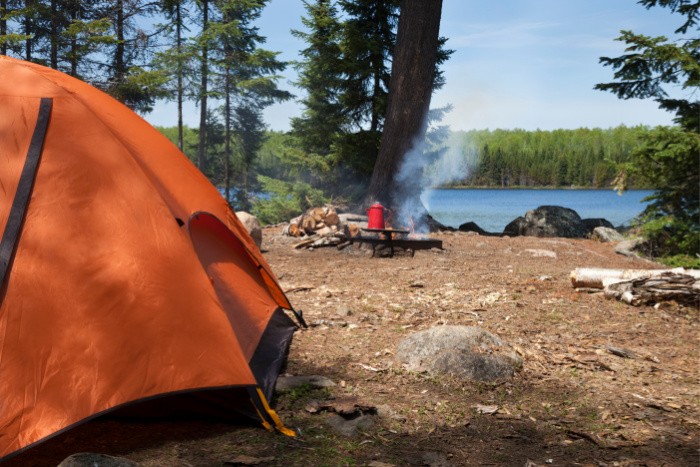

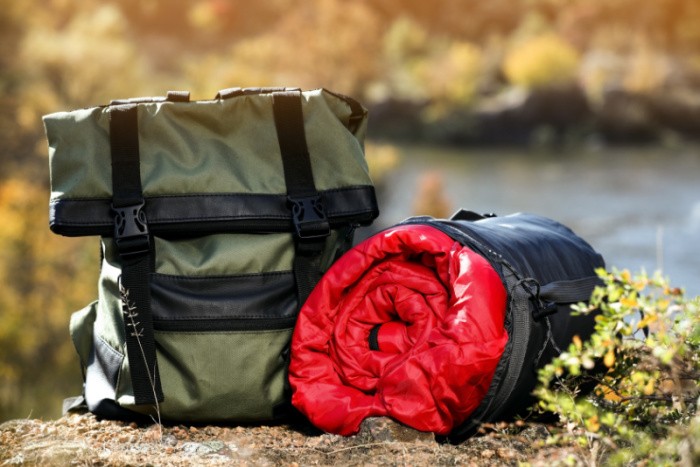

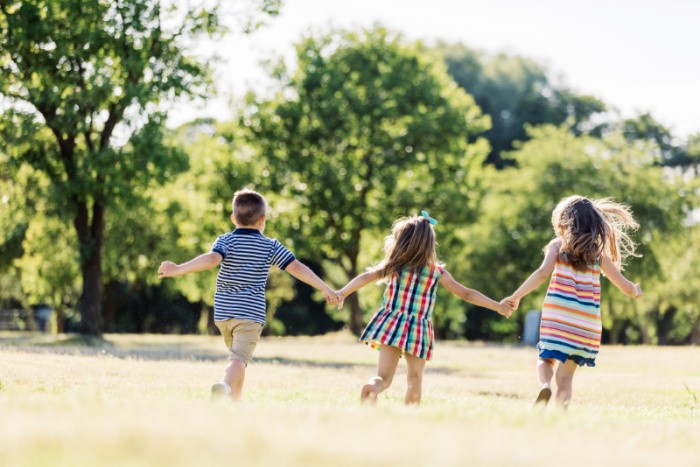
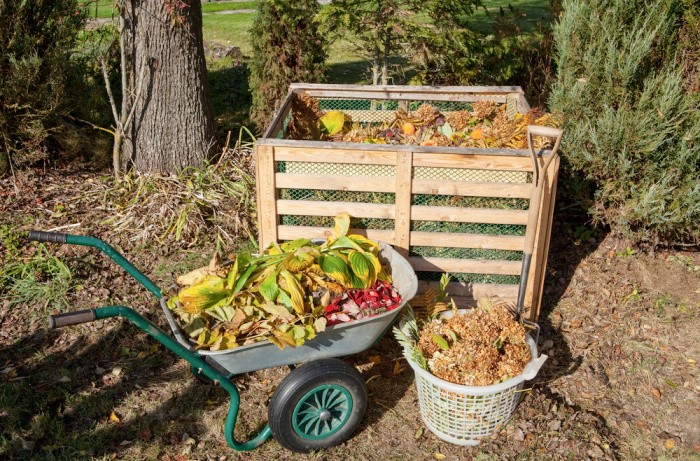

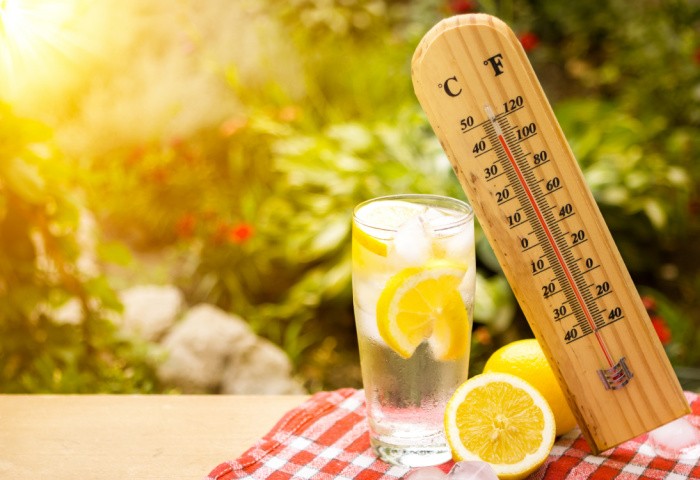













Linda,
Great post for adult neophytes as well as teens. I know many adults who haven’t a clue and would almost certainly perish if they got lost in the wilderness. Your gear list is absolute gold. I will be passing this on to my daily email distribution.
Hi Harry, thank you for your kind words, my friend. If your kids have been involved in the Boy or Girl Scout programs they will have learned a lot. But having parents taking you camping, fishing, hunting, and hiking will teach them many skills by example. Skills are critical! Linda
Parents will have to be involved or get involved in order for this to happen. If you can’t teach them then get them to someone who can. Maybe do it together.
It’s so rare I can’t think of a single person I know doing so though within the last 5 years
HI Matt, I have to agree with you on these skills not being taught like they did when we grew up. Kids and grandkids love to be involved in camping, fishing, hunting, and hiking. They need to learn skills that they can use their entire lives. Linda
This article will be great for my son and his wife. Both are learning and health disabled and I think his wife is more inclined to figure these things out before he does. They are good kids they just need a lot of help.
Hi Jackie, I love to share tidbits that will help those who want to learn. I learn something new every day, I swear. Linda
Everyone also needs to know methods to NOT broadcast their location to others.. examples could be an unshielded fire, clanging or shiny parts on gear, loud talking,.. Knowing these can help with rescue as well as avoidance of preditors- of all types.
HI Denise, great comment, keep the smoke down and make less noise. Great comment! Linda
This article is wonderful and I am forwarding it to my son. I admit I am one of those adults who would not survive in the wild, but there is still hope for my grandsons. Thank you Linda. Stay safe and healthy everyone
Hi Chris, at my age I will not be going into the wilderness. But my kids and grandkids have some of these skills, but it doesn’t hurt to learn more. Linda
With my mobility challenges, I would be a detriment to any group that goes into the wilderness for survival reasons. While I spent most of my teens and twenties camping and backpacking every chance I could and know those 5 skills well, I wouldn’t make it 50 feet into the wilderness today without a major fall or injury. Walkers are not designed for rough terrain.
I have two daughters, one who knows the 5 skills plus more and another who only knows how to start a fire because she wanted to use the fire pit in the yard to make s’mores. Amazing that you raise kids in the same environment, the same experiences and the same parents and yet it may not seem that way when they are adults.
Hi Topaz, I hear you! I have four daughters all raised the same way but they are all different. Life is good either way! Linda
Great post Linda! But yours alway are. I did forward this to our son. He’s a scout leader. They’re boys are grown and gone, but he’s still doing the scouts. Well, he’s actually the assistant leader, but does all the work. He’s a great leader. His youngest got his Eagle! It helped him when he joined the Marines. He’s out now. The oldest aged out before he got his Eagle.
HI Deborah, thank you for your kind words, my friend. Having a great scout leader like your son is what it’s all about. Life is good when kids have leaders to look up to and respect. I love it. Linda
One of his former scouts, or died in a car accident recently. He came to out son and talked with him about it. That’s the only time that he’s talked about his mom’s death. She was also a dear friend of our daughter. So so sad. The mom was only 51.
Good article to remind us to teach and inspire others. I offer food for thought. This something I tell people when it comes to survival or prepping, so they are not afraid to learn or find it too daunting a subject. I like to promote prepping and survival so others can benefit in times of trouble.
I watch and read a lot about survival, bugging out and prepping and one thing that bothers me is when someone jumps in (I see this often on YouTube) claiming skills being more important than gear. This is the guy that thinks he can walk into the wilderness with nothing but his clothes on and because he “has skills” he’s going to survive anything. This kind of person does a disservice to others with such prideful comments. Not everyone can do this and why risk your life when you can be prepared. Besides most of us live in suburbs or cities and not in the woods like pioneers.
I think it’s important for us in the know to explain to the uninitiated (Children and adults) that knowledge and skills are equally important, but that survival is always easier with gear and supplies and that there is no shame in having everyday carry items, minimal emergency kits, and so on. As a matter of fact, many people would have survived being lost in the wilderness or in a broken down vehicles if they had a small kit. Prepare once and you are ready for anything down the road.
When we use gear, tools, supplies to accomplish a task we are gaining both knowledge and skill. And the reality is that some things can’t be done with a knife made from a seashell and using a rock as a hammer. First aid, canning, food storage can’t be accomplished without equipment, yet they all require some learning and some practice. And then again, not everything requires tons of practice and repetition. But in the end the only thing that matters is surviving.
And those who suggest, “What if you don’t have…. ” To them I say, well that’s what being prepared is all about. We can make a choice to have a kit and/or what we might need.
I’m no master of knots and I can’t make fire from rubbing sticks, but I know how to setup a tarp or other types of shelter using bungee cords, rope, clamps, toggles, etc. I know how to use tools to make fire, how to collect the wood and how to build the fire. And I can filter and boil water, but like many people I do own a few filters which make water 99.97 pure. We have options and different methods to chose from to add to our repertoire of survival skills and abilities. And we can always learn new things.
Anyone can learn enough to enjoy camping and to survive outdoors, but we don’t have to be as good as mountain men or wilderness experts. Even a fanny pack or waist pack can hold enough gear and supplies to survive in the outdoors or deal with an emergency.
Hi Frank, oh I love your comment! You are so right! You nailed it! We still need gear, even if it’s a fanny pack. I LOVE LOVE LOVE your thinking! Linda